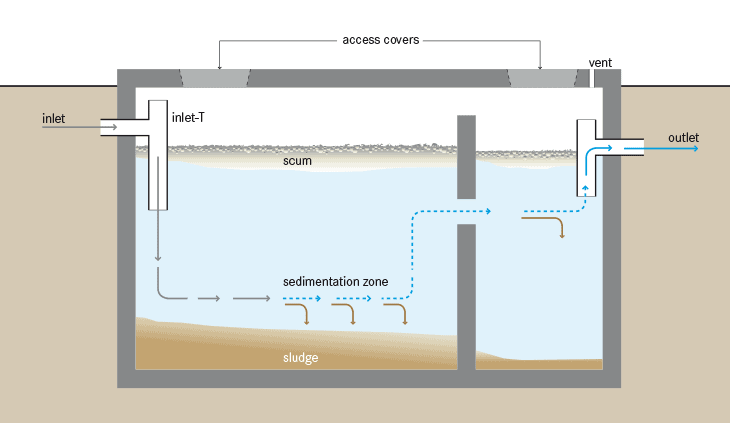Do Septic Tanks Need Electricity?
If you are living in a home with a septic system you may be wondering if there is anything you need to know about the operation of your septic tank when there is no electrical power available, like in the case of a power outage.
So, does a septic tank need electricity? No, most septic tanks do not need electricity to operate as they are designed with a siphon to allow gravity and the slope of the system to move wastewater from the tank to the drainage field.
However, there are some types of systems that may include electrical components that do require electricity to operate. Continue to read this article to find out more about each of these types of septic systems and why electricity is important to some and not others.
How Does the Septic System Design Dictate a Need For Electricity?
Gravity-Based Septic System Siphon Design
Like we mentioned above, most septic systems are designed to allow gravity and the pitch of the system pipes to move the waste into the septic tank, and then out of the tank into the leach or drainage field.
You may think that this is a simple and archaic method of moving your wastewater through the system, I know I did when I compared it to other options, however, what you will quickly come to understand is that when it comes to septic tanks the simpler the design the more elegant it is.
Think about it this way, if your system is designed to use gravity to move the wastewater through the system, there is less chance of a mechanical part breaking and causing headaches as the parts wear out.
Also, last time I checked we don’t use our gravitational pull and start floating into space every time the power goes out. This means in this type of system, you don’t have to worry about electricity being on or off for your septic system to function properly.
Electrical-Based Septic Tank Pump Designed Systems
If your system is designed using a septic tank pump then it will need to have electricity to operate. That means in a power outage where power is cut off from your septic tank pump, you will need to watch water usage to make sure your septic tank doesn’t back up.
These electrical septic tank pump systems DO REQUIRE electricity as you may have imagined by the name.
One of the reasons these electric-based systems require electricity is because they are built with an electrical pump that pumps the waste water from the septic tank to the drainage field.
What is a Septic Tank Pump?
What is a septic tank pump? A septic tank pump is an electrical submersible water pump that can either be installed in the final chamber of your septic tank, or in a separate pump sump after the septic tank. This pump typically operates with a float switch, and when the float reaches a certain level it kicks on the to pump wastewater out of the tank.
So unlike a septic tank system that works on gravity to move the processed wastewater out of the tank, in an electrical system, the pump is required to move the effluent (wastewater) out of the tank.
With these types of electrical septic systems, a loss of power can cause issues for you as it can cause your septic system to back up.
Why Does My Septic System Have a Pump?
Ok, so you might be asking yourself why does your septic system have a pump? A Septic System will have a pump if you need to pump the effluent (wastewater) from the septic tank up to a higher level.
This might be needed when your final effluent disposal location (aka. drainage or leach field) are located at a higher elevation than the septic tank outlet, meaning a gravity-based siphon system can’t be used to move the water from the septic tank to the leach field.
What Should You Do During a Power Outage if You have an Electrical-Based Septic System?
If you have a septic system that uses electrical components like a septic tank pump and you are faced with a power outage to the system, then here are a few things you can do to minimize problems.
- Limit Use of Water During The Outage
- Take shorter showers
- Try not to run the sinks for extending amount of time
- Try not to flush the toilets too much
- Laundry should be minimized if you have power to it
- Limit baths and dishwashing
During a power outage your electrical septic tank pump won’t kick on to help move wastewater out of your septic tank, this could cause a backup and major problems so make sure you limit the strain on the septic system by watching your water usage while the electricity is out.
If you have a gravity based system you should be fine mantaiing normal water usage during a power outage. That is of course unless your house also uses a well and requires an electrical pump to supply the house with water.
Can I install back up power on my septic tank pump?
You can have an electrician install a backup power supply to keep your septic system running in the case of a power outage.
If your system was sized appropriately, your first septic tank compartment should have enough room to last at least a day or so before it backs up. So if the power comes back on in that time, the pump should kick back on and move the wastewater out of the septic tank with no problems if you conserved water usage during the outage.
Other Septic System and Electrical Related Questions
How can I tell if I have an electric pump based septic system?
Here are some hints that might help you quickly figure out what kind of system you have.
- Look at the engineering and installation blueprint to see a pump is mentioned in the plans.
- Take a look at your drainage field, is it on higher ground from your septic tank. If it is then you know the effluent is being pumped uphill, which means you can’t be using a gravity-based system and must have an electrical pump installed.
- Call the listing agent or previous owner of the house if you recently moved in
- Call the septic tank inspector or take a look at your septic system inspection report to see if there is mention of the system components.
- Contact the city to get a record of the permit and see if they can help you with the question.
What if my Septic Tank Alarm goes off during a power outage?
Sometimes a septic tank alarm can go on during an outage, or when you restore power to the system. You can silence the alarm if has that feature. But what you want to do is if the alarm goes off when power is restored, wait for 24 hours the alarm should stop once the water level is pumped out of the tank by the pump.
If the alarm is still going off at that point then you want to call a professional to have them check it out.
If you want help finding a local septic system professional click here.
What Should I do next to know what to do with my septic system the next time the electricity goes out?
The first thing you want to do is find out exactly what kind of system you have in your home. As we’ve discussed in this article the type of system design you have will make a big difference in how a power outage affects your septic system.
- Find out if you have a gravity-based system or an electrical pump-based septic system.
- If you have an electrical pump-based system then make sure you and your family have a water usage plan for when the power goes out. The best thing to do is to have strict water usage rules in place before you are in that situation.
- Include a list of water-based activities that continue, and another list of activities that should be postponed or limited until the power returns.
- If a storm is on the horizon try to have people take showers as close to the storm hitting as possible to avoid added pressure to shower during the outage.
- Consider having a backup generator installed on your home or system to keep the electricity going to the system in times of prolonged outages.
I hope this article has helped answer the questions you have about your septic system and its electrical requirements.











